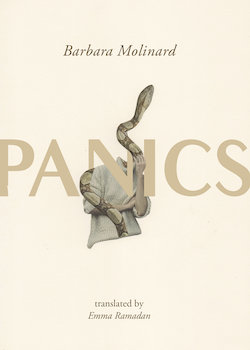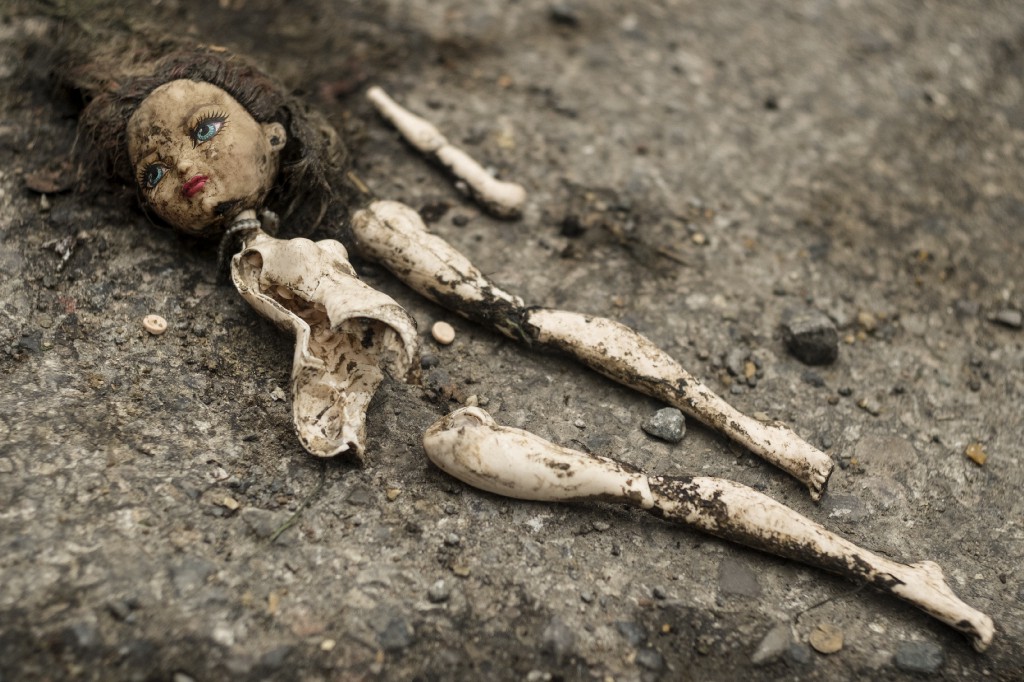Lit Mags
A Landlocked Parisian Swims in Her Fantasies
"Happiness" from PANICS by Barbara Molinard, translated and recommended by Emma Ramadan

Introduction by Emma Ramadan
Five years ago, I was reading through a book of Marguerite Duras’ collected nonfiction when I came upon her preface to a book called Viens by an author I had never heard of. A tingling feeling came over me as I read Duras’ words about this writer, how she wrote and wrote and wrote, but then immediately destroyed every page. How Duras had to bring the fourteen stories collected in Viens to the publisher herself, rescuing them from Molinard’s compulsive desire to tear to shreds all she had written.
 Duras painted a picture of a woman in pain, a woman who felt alienated from everyone, including her own family. Especially striking was that this author’s work, disturbing and frightening, depicted something not “invented” or “dreamed” but in fact “lived.” The stories in Viens, now in English as Panics, are not mere eerie imaginings, they are not meant to offer incisive commentary on the absurdity of the world, but instead to reveal how the author experienced life—as something warped, haunting, insane. She did not conjure up or observe this insanity; it existed within her.
Duras painted a picture of a woman in pain, a woman who felt alienated from everyone, including her own family. Especially striking was that this author’s work, disturbing and frightening, depicted something not “invented” or “dreamed” but in fact “lived.” The stories in Viens, now in English as Panics, are not mere eerie imaginings, they are not meant to offer incisive commentary on the absurdity of the world, but instead to reveal how the author experienced life—as something warped, haunting, insane. She did not conjure up or observe this insanity; it existed within her.
This woman was Barbara Molinard. Molinard (1921–1986) was born in Paris and lived out her days there with her husband, the filmmaker and photographer Patrice Molinard, and their two daughters. Starting in 1960, she dedicated herself entirely to writing. Despite all the years of devotion to her craft, despite the countless pages written, Panics is the only book that survives.
I set off to find this book, but it wasn’t easy. I couldn’t buy it online, and the French publisher didn’t have a digital copy. The book had all but disappeared soon after it was published in 1969. Finally, I managed to get it through interlibrary loan to the Providence Public Library by way of Princeton. It felt like something of a miracle to hold this forgotten book in my hands. As soon as I read the first story, I knew the book was exactly what I had imagined; I was in its grip just as Duras had been. Each story, such as this one, ”Happiness,” where a woman’s manic delight in her new home by the sea is not what it seems, recounts a haunting, sometimes upsetting or surreal experience, usually focused on one character whose world appears normal until suddenly something shifts and we realize everything has slipped out of control, or maybe their tenuous grasp on reality was never there to begin with.
Barbara Molinard was trying to write her way out of something. Through her words, I was given an opportunity to try to translate my way out of it, too. This world of little panics might well have stayed forgotten, but by an improbably set of circumstances, something else happened instead. Duras felt it urgent that people have access to Molinard’s writing, she knew there was something in it that needed to be shared. I am thrilled to be sharing it with you.
– Emma Ramadan
Translator of Panics
A Landlocked Parisian Swims in Her Fantasies
Barbara Molinard
Share article
“Happiness” by Barbara Molinard
Clarisse de Karadec, née Desanges, hurried to the table; the deed to her house was there, where she’d put it the night before, amid the various papers and the enormous heap of envelopes. God, she’d been scared! Joyously she embraced the precious document and set it back down on the table. As she glanced mechanically at the envelopes spilling in every direction that all bore her name written in the same tall, dancing handwriting, she noticed with a smile that they hadn’t been opened. But when she saw that many didn’t have a stamp anymore, imagining that one of her friends must be a collector and was nabbing them while she slept, she couldn’t help but laugh.
Waking up in her house for the first time, she was delighted to already feel at home there: “My house!” she shouted in a radiant voice, glancing around the room for maybe the hundredth time since the day before. “Ravishing,” she murmured, leaning against the wall in order to fully take in the room, “truly ravishing, a bit bare perhaps; I’ll need to buy statues, heaps of statues.” She remembered seeing some recently that were very beautiful… in a park… or in a forest. “Life is wonderful.” If she hadn’t resolved to act with the utmost discretion toward the friends she’d invited to spend a few days in her house, she would gladly have gone to say a quick hello. How astonishing life is, how surprising, wonderful, and unpredictable, she thought. Who would ever have thought, even a few weeks ago, that today she would be in her house! And the sound of the sea that would never leave her, such rapture! She ran to the window, opened it wide, and inhaled the fresh air with delight. That sea she saw stretch before her infinitely, as far as the eye could see, fascinated her. She promised herself that as soon as it was nice out, she would bathe in the sea and bathe in the sun too; her body needed it so badly! In the meantime, she would exercise every morning. She was very proud of still being able to jump like a little girl even though she was more than thirty years old, and she could also climb up a rope like a squirrel on a tree. She gasped; fully dressed people were entering the water. Eyes gazing into the distance, she saw streets, cars, haggard people walking on their own and seemingly oblivious to others. She held on to the window frame to steady herself; they advanced slowly into the open water and then, suddenly, they disappeared. Softly she fell to the ground.
When she came to, it seemed the sun had set. The weather is turning gray, she thought sadly. I need to light a candle, that’ll brighten things up. Comforted by the idea, she got up, slowly crossed the room, and lay down on her bed. If the telephone had been connected, she would have immediately called one of her friends, anyone at all, just for the pleasure of hearing a voice. Luckily there are birds… the sea and the birds, so I’m never alone… She stretched voluptuously, a smile on her lips. Suddenly she thought of what she would have for lunch: caviar, bread, champagne; she jumped up. When she put on her gloves, coat, and hat and looked at herself in the mirror, she was astonished that the woman she saw staring back was her: Clarisse de Karadec. If not for the color of her clothes, she wouldn’t have recognized herself; she was pleased that for some time now, or even longer than that perhaps, she didn’t remember exactly, she never bought clothes unless they were black, mauve, or white. It’s not that she particularly liked those colors, but that’s what she had decided one day, she didn’t know why anymore, and when she tried to remember she couldn’t, but became infinitely sad.
How astonishing life is, how surprising, wonderful, and unpredictable.
In the street there weren’t many people; the rare few were walking quickly through the rain. Clarisse thought they seemed tense, unhappy; that always struck her, out in the street, those faces full of desolation and sadness as though they weren’t, like her, happy to be alive. A bakery full of light and cakes wrested her from her thoughts; she paused for a moment to look in the window and entered the shop. Standing, she gulped down three éclairs, a rum baba, and two tarts. Then she paid and left.
A formation of planes passing over the city made her jump; lifting her head she watched them set off fireworks; it was splendid! She had never before seen anything so beautiful. Alone on the sidewalk—the passersby had taken shelter behind carriage doors—Clarisse, dazzled, admired the shapes in the sky. Then abruptly it all stopped and the sky went dark again. The street seemed sad: always the same stores! the same narrow sidewalks! the same street lights! Always everywhere the same thing! But elsewhere there wasn’t the noise of the sea audible in the distance. Over there was missing that air full of salt and marine fragrance that for her was like a light perfume, a promise of happiness. She was eager now to get back home, to her house, to be in her beautiful room, but first she had to buy the champagne… the caviar… To save time she started to run. At the end of the street she took another street to an intersection; crossing it she reached the store at the corner and entered. It was packed. Waiting for her turn to be served, she examined the vegetables: they were splendid! Tomatoes fat like pumpkins with a skin so fine and soft that it reminded her of baby skin. It must be wonderful to bite into them, but she hated tomatoes. Too bad! she thought. These must be quite good… A pat of butter started to melt before her eyes, spreading over the counter and proving that it must not have been as cold as people were saying. They said it was 33 or 34 degrees—madness! And yet everyone seemed to believe it because they were all dressed in warm clothes! Fortunately she had stopped being surprised by anything some time ago! The butter was now a large waterfall; concerned about the puddle forming on the ground behind the shelves, she bent down. “Can I help you, Madame?” Clarisse jolted back up. The saleswoman, a smile on her lips, was standing next to her. As she was being served, Clarisse de Karadec was moved by how friendly the saleswoman was to her, and the owner at the register too, who, when their gazes met, flashed her big gracious smiles. To repay their kindness she decided she would always buy her groceries in this store. Without worrying about the passersby she jostled on her way and who furiously grumbled through their teeth or called her an old lunatic, she finally arrived in front of her house and felt an immense happiness upon seeing it again. “Life is marvelous,” she murmured, climbing the stairs wearily, “and everyone is so nice …” On the second-floor landing she saw two of her friends; she would have liked to stop and say hello to them, but she didn’t want them to feel obliged to invite her to lunch or dinner, and so she simply nodded her head at them. They responded with a friendly smile and went on their way; her friends’ discreet courtesy touched her and she was glad to have invited them.
Back in her room she saw the wide-open window and the soaked ground. I’m incorrigible, she thought, laughing and leaning over the hand rail to gaze at the sea; but she saw nothing; only the smashing sound of the waves resounding in her head proved that the ocean was still there. There was a thick fog before her, then, suddenly the sea, howling, unleashed, hollowed with grooves, bloated with waves furiously furling and unfurling. Fascinated by the deafening sight, Clarisse de Karadec kept her eyes riveted to the ocean. Body tense and heart alert, with neither a gesture nor a blink she participated in that raging, thunderous unleashing of the sea: “Men might be drowning… Men have drowned,” she murmured. “One day a man drowned… One day a man drowned,” she repeated, with the vague feeling that through these words she would remember; that she had to remember. An immense sadness invaded her heart, and for an instant she was aware that her brain was an abyss into which her thoughts were sinking irremediably. She was suddenly very cold; she left the window and on the other side of the room she lit the small gas radiator that served as her heater.
An immense sadness invaded her heart, and for an instant she was aware that her brain was an abyss into which her thoughts were sinking irremediably.
Now sitting in a chair with a radio on her knees, she listened gaily to a song; nothing subsisted of the tidal wave that had just so deeply unsettled her. With a stunned glance around her room, she declared that she would buy statues, statues that would nearly reach the ceiling… she had seen one that day in a park… she would just find that one… and then she would throw a costume ball… all the men would be naval officers. Radiant, she stood up and started to dance. Abruptly realizing that she was dying of hunger, Clarisse de Karadec pulled out the provisions she’d bought and put together a plate with two slices of ham, a petit suisse, and an egg, then grabbed the bottle of cider and poured herself a large glass. God, it was good! She had no idea she was so thirsty! She poured herself another glass, placed it on the table without drinking it, and sunk her teeth into the ham, which was simply exquisite; she was about to serve herself the last slice when she was seized by a brusque fit of laughter thinking again of the caviar and the champagne. It was so funny, their habit of always giving her the wrong thing! She couldn’t get a hold of herself, tears were streaming down her face, she hiccupped… Once she’d calmed down, she felt a sudden fatigue. With her head hunched over her chest, she remained drooped in the chair with her eyes closed, listening to the gentle rustling of the sea.
Although she had barely slept, when Clarisse woke up and saw that it was nice out, she jumped out of bed and ran to the window. In the blue of the sky, which she deemed as blue as the blue of her eyes, a golden ball hovered immobile in space. She was marveling at the splendor of that globe when suddenly she noticed that nothing was suspending it and that it could fall at any moment; seized with fright she shut her eyes. But suddenly realizing that she’d be able to swim, her fear vanished on the spot. She ran to the armoire, took out a cardboard box, and opened it. There was her bathing suit, wrapped in tissue paper, mauve with a white trim, it was quite pretty; she was not disappointed. She had bought it a few days earlier in Paris, although she hadn’t known at the time that she would be living by the sea. Maybe if I hadn’t bought it, I wouldn’t have come to live here, who knows? She burst out laughing. When she had put it on and looked at herself in the mirror, Clarisse couldn’t believe her eyes: could it be possible that she was this beautiful? It was inconceivable. Head on, from the side, from an angle, from behind—she was perfect! An envelope under her door that she glimpsed in the mirror wrested her from her contemplation. Her heart racing, she bent down for the letter. Maybe it was the letter she’d been waiting for? The tall, dancing handwriting reassured her. But why had she written Desanges instead of Karadec! This error, for which she could only blame herself, left her perplexed for a moment.
It wasn’t a big deal, the important thing was to have the letter. A smile spread across her lips.
I’ll open it with the others, later, when I’m old, she thought gaily, throwing the letter on the table with the rest.
She was about to go out for a swim when she had the thought that it would be much simpler, and also much more agreeable, to dive directly from her window. As she admired the ocean before her eyes, gray and gleaming like asphalt, Clarisse enjoyed imagining the pleasure she would feel soon, in just a moment, as her body slipped between the waves. But was that the only thing she desired from the sea, this pleasure, this joy? Wasn’t there, down in the depths of the ocean, some hidden treasure that she had lost… A strange emotion, a wild, insane, delirious hope took hold of her. “Life is marvelous,” Clarisse mumbled. She filled her lungs with air and with a thrust of her whole body, she jumped.
Avenue de l’Opéra, an ambulance picked up the body of a woman in her sixties, crushed on the sidewalk. She was wearing nothing but a mauve bathing suit with a white trim.








